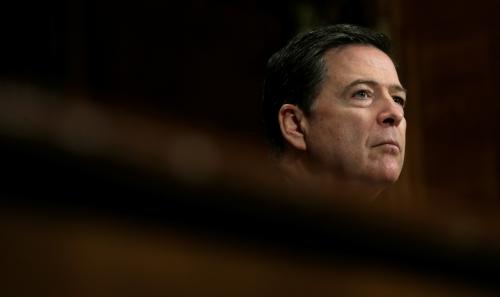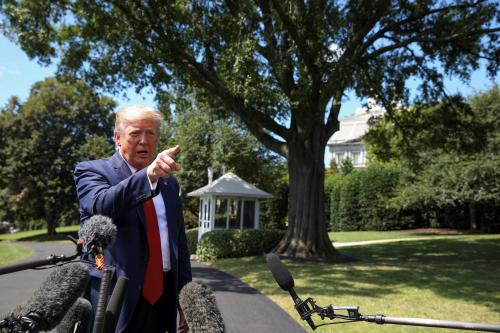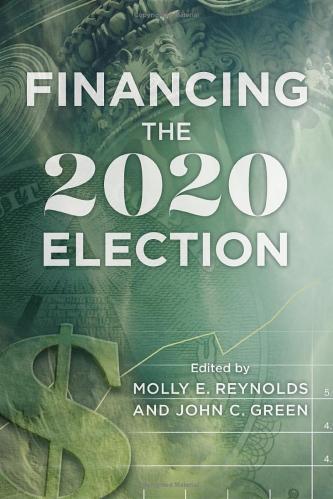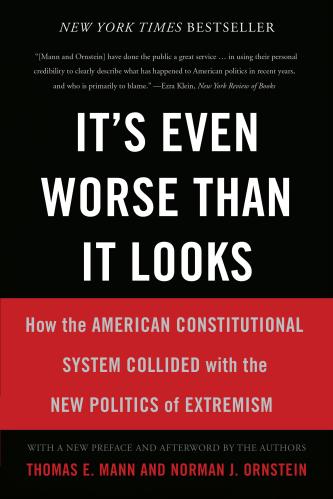The president’s apparent disclosure of classified and highly sensitive information to the Russian Foreign Minister and Ambassador is a serious act. An intelligence breach always puts the lives of spies at risk. And when that breached intelligence is gathered by a friendly country and shared with the United States, it puts the relationship of trust at risk and jeopardizes other nations’ willingness to share intelligence with the United States. Such an unprecedented action has a simple but ominous result: it risks the national security of the United States.
Below these top-line worries about the immediate fallout from the president’s irresponsible behavior are additional concerns, one of which involves personnel. This past week, the president publicly contradicted his own staff’s explanations of news reports on multiple occasions. When a president throws his own staff under the bus, it does not only affect those individual staffers. Such behavior has ripple effects on all current staff, and compromises the White House’s ability to recruit future personnel.
Last week, in the wake the firing of FBI Director James Comey, the White House pushed Sarah Huckabee Sanders to the press room podium and Sean Spicer into a thicket of White House shrubs to defend the action. They claimed that the president lost faith in Comey’s leadership and was simply listening to the Deputy Attorney General’s recommendation. They denied that Comey was fired because of the ongoing investigation into possible Trump campaign collusion with the Russian government.
However, in a subsequent interview with NBCNews’ Lester Holt, the president explained he planned on firing Comey regardless of the Deputy Attorney General’s recommendation and even went on to say “…when I decided to just do it, I said to myself, I said ‘you know, this Russia thing with Trump and Russia is a made-up story…” Those words and claims immediately undercut the White House spokespeople and the ability of the media and the public to believe the information White House staffers were offering. It was an embarrassing moment for the White House communications office, as the president himself effectively told the world that Spicer and Sanders did not know what they were talking about.
It was also embarrassing moment, too, for the new Deputy Attorney General Rod Rosenstein. The president commissioned Rosenstein to put together a recommendation on Comey’s conduct, only to explain to the world that he did not care about that recommendation, even after his spokespeople laid blame for the firing entirely at Rosenstein’s feet.
Yesterday, in the wake of Washington Post reporting that the president shared classified information in an inappropriate way with the Russian Foreign Minister, the White House response this time came from National Security Advisor H.R. McMaster. Before denying a series of items that the Post story never alleged, McMaster began with a blunt statement: “The story that came out tonight, as reported, is false.”
The president then seemingly undercut General McMaster Wednesday morning in a series of tweets in which he defended sharing information with the Russians. He tweeted, “As President I wanted to share with Russia…which I have the absolute right to do, facts pertaining…to terrorism and airline safety.” Trump then tweeted an additional complaint about “LEAKERS in the intelligence community” (caps in original). The tweets seem to admit that classified information was shared, as the president noted his “absolute right to do.” His concern with “leakers” rather than “liars” suggests, too, the Post story is accurate.
The president’s willingness to undercut his staff’s words, reputations, and integrity is something that everyone in government will notice. While Spicer, Sanders, and McMaster have good reason to be irate with a president who treats them like adversaries rather than allies, every member of the administration will have to think twice before sticking their neck out for their president. When the White House prepares comments, notes, or talking points for an official, he or she should have two questions. First, how much of this information true and accurate? Second, will the president subsequently contradict me in public?
Eventually—if it has not happened already—White House and other administration staff will start to question whether the president cares about their careers or their standing in professional life. Those internal questions hurt morale, limit the president’s ability to push his agenda, complicate communication and coordination within the White House and the remainder of the government, and can lead to significant attrition.
The personnel problem goes deeper for a president with reckless rhetoric and a penchant for diminishing staff. Those behaviors make it all that much more difficult to recruit high quality, committed, serious personnel to fill vacant positions—those that have thus far gone unfilled and those that will eventually open up during the course of a presidential tenure. President Trump faces glaring numbers of vacancies in some of the most critical positions in government. Vacancies in the state and defense departments, among U.S. Attorneys and others across government make the job of governing that much more challenging, particularly in the national security context. In many cases, these vacancies involve very important decision makers and managers, not remedial roles that have little impact on the president’s agenda.
The president needs to fill hundreds of serious, meaningful policymaking positions directly connected to his priorities and his campaign promises. More than most presidents, this president needs highly qualified individuals with both political gravitas and substantive knowledge to push through his agenda. Right now, many qualified conservative and Republican “would-be” appointees, those on short-lists or who would normally be on short-lists, and even those currently being vetted must be looking at this White House and seeing a series of red flags. Every day that President Trump shows public disrespect for his existing staff, pools of qualified applicants will be scared off.
The Brookings Institution is committed to quality, independence, and impact.
We are supported by a diverse array of funders. In line with our values and policies, each Brookings publication represents the sole views of its author(s).











Commentary
After Comey and the latest intel blunder, who’d want to work for Trump?
May 16, 2017